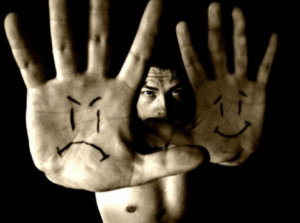Tilt is when you let your emotions get the better of you in poker or any other esport. You start making decisions based on your feelings and emotional swings, rather than facts (your observations and knowledge).
Tilt clouds your judgment, making you see everything through a lens, and it’s one of the most dangerous things a player can face.
This is because you’ll make a bad decision based on your emotions, which will likely lead to a negative outcome, which will only make you tilt more and play even worse.
Don’t worry, everyone tilts to varying degrees!

As dangerous as tilt can be, there’s no simple recipe you can follow to completely avoid it—it’s the human factor.
Even the best players you’ve probably seen on TV playing ridiculously high-stakes cash games are prone to some degree of tilt. One thing that separates the best players from the rest is their ability to focus on decision making rather than short-term results.
If you focus on short-term results, no matter how good you are, you’ll tilt a lot. In fact, the better you play, the more likely you are to tilt and risk it when things don’t go your way.
This feeling is primarily caused by a sense of unfairness. You did everything right and still lost the pot or busted out of the tournament.
How can you avoid feeling bad about it?
Understanding the harsh reality of the game can make your life much easier.
What is a bad beat? If you had AA against 22 and lost an all-in preflop, is that just really bad luck?
In reality, your opponent had about an 18% chance of winning, and they’ll win almost 1 in 5 times. Understanding the math and outcome of events makes it much easier to deal with randomness in the game.
In the long run, you’ll still win 82% of the time, so getting angry because it’s time to lose is ridiculous, to say the least. Of course, this is just one example, and many different things can trigger tilt.
But if you focus solely on making the best possible decision, taking into account all available information, the expected value, and setting short-term results aside, you’ll avoid much of the negative emotions and better cope with moments of variance.
While you probably can’t avoid tilt in all its forms, what matters is what you do when it happens and how you manage it.
The above example is just one of many causes of tilt at the poker table. Not everyone is triggered by the same things.
Play as correctly, consciously, and balancedly as possible, and your results will be more or less stable in the long term!

Comments are closed